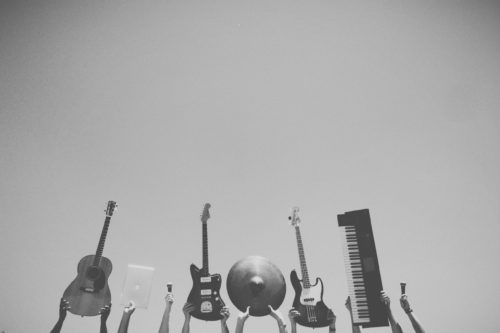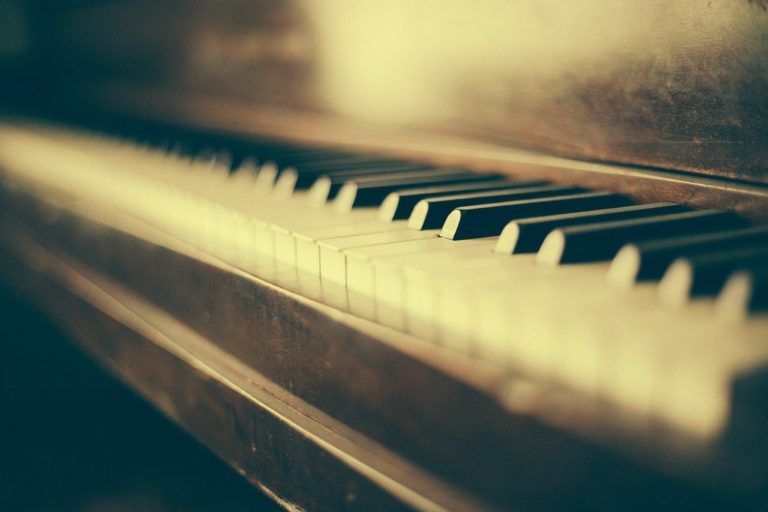Guitar or Piano: Which is Easier to Learn?
Did you know that piano and guitar are the world’s two most popular instruments? Of course you did. After all, that’s probably why you’re here.
So, which is easier to learn: the guitar or piano? The piano is easier to learn than guitar, but the opposite is true when it comes to reaching mastery. Meanwhile, it takes longer to get the basics of guitar down pat, but advanced skills generally come sooner.
But this explanation doesn’t capture the nuances of each instrument. Plus, difficulty is a subjective term that depends on players’ individual traits. Read on for a breakdown between the unique challenges of both guitar and piano.
How Do You Learn Guitar?
Generally, the first goal of playing the guitar is getting a sound to come out. The struggle of strumming a chord is especially pronounced for acoustic guitars. Thus, you’ll probably hear your teacher or YouTube tutor say “callouses” until you start dreaming about them.
Once you develop callouses, you can strum chords without pain. Notes will also sound crisper.
Then, you begin specializing in a genre. If you’d like to play pop music, you can start playing your favorite songs within a few months. If you’d like to play jazz, well, good luck — you’re in it for the long haul.
Next comes learning the fretboard notes. Some people recommend learning the fretboard before forming chords. Others recommend learning chords before figuring out where all the notes are.
Both approaches have their merits. Being able to look at a random note and immediately remember “that’s a C” takes time on guitar. Chords, scale patterns, and intervals make it easier to find relative notes. Because knowing chords makes the process easier, it’s logical to learn them first.
However, understanding the notes on the fretboard before tackling chords makes playing your first song incredibly easy. The caveat? You might not be able to play anything for a good while.
Ultimately, you’ll never become a perfect guitarist. Even Stevie Ray Vaughn wasn’t flawless. But once you can navigate the fretboard quickly and effortlessly, you’ve come close. For most people, this takes between five and ten years (depending on practice frequency).
What Are the Most Difficult Parts of Learning Guitar?
There are many difficulties you’ll face as you learn guitar. Training your hands to swiftly alternate between unnatural positions is one of the most challenging aspects.
As BPM rises, so does the struggle. Many guitar players must spend months correcting a common mistake. Naturally, this is a mistake you desperately need to avoid.
The mistake? Sacrificing form for speed. This is especially common among guitarists who want to shred, or play heavy music incredibly fast. As much of a drag as it may be, it is best to avoid playing beyond your skills. Think of it like weightlifting; it might be cool to move more weight, but not when you risk debilitating injuries.
Instead, practice songs within your skills so that you can better play the “cool” ones in the future.
Don’t try to climb an entire staircase with one step or you’ll never reach the top.
Our point is that patience is another tricky part of learning guitar. Playing quickly while forming complex chords is undoubtedly problematic. Thus, it takes time — a lot of time.
How Do You Learn Piano?
Learning piano is relatively easy. As a result, it’s common to learn the basics at a young age (although you may be more compliant as an adult).
Piano training often begins with the C Major scale. Why? Because all you need to do is play the white keys by beginning and ending on a C. The only “challenging” part of this is figuring out which notes are Cs.
Fortunately, determining notes on a piano is straightforward. Cs and Fs, for example, have a white key directly to the left of them. Meanwhile, a D is sandwiched between two black keys. In a few weeks of practice, you’ll be able to quickly identify each note on a piano.
But C Major and A Minor (which only use white keys) are not the only modes. To become an intermediate piano player, you must learn to play B Minor, F# Major, G-flat Lydian, etc. This means you’ll need to get comfortable with playing black keys.
Black keys are sharps and flats. They give depth to music but also make things trickier. When it comes to sheet music, sharps and flats may give newbies a headache.
Oh yeah, and you’ll want to understand sheet music. A significant portion of piano music exists as sheet music. If you want to play complex classical pieces, you’ll need to be excellent at reading sheet music — especially if you’re going to join an orchestra.
The transition from beginner to expert pianist takes 10 to 15 years. Understanding how to play the piano is one thing. However, training your fingers to keep up is remarkably challenging.
So, whatever you do, do not be deceived by how easy piano seems initially. It will get tough.
Most Difficult Parts of Learning Piano
Again, piano is easy to learn but hard to master. Don’t let your impressions of your first piano lessens mislead you — you’re in for a ride.
We’re not trying to scare you, however. On the contrary, learning to play the piano is a rewarding journey. It’s just that there are several difficult parts of playing piano you’ll encounter.
Looking at the big picture, there are two main complex concepts to learning piano. The first is developing dexterity. Like the guitar, your fingers do all the work. But with a piano, it’s more about precisely hitting the correct keys.
Plus, an 88-key grand piano is massive. After all, it has the widest pitch range of any instrument (excluding the organ, which is essentially a piano with pipes).
Unfortunately, you can’t stare at the keyboard when reading sheet music. Instead, you must rely on muscle memory. This entails creating a spatial map that lets your muscles know how far in one direction they need to move to hit a particular note.
Secondly, you need to develop hand independence. Pianists often play bass and treble simultaneously, which guitarists don’t have to do. However, this is much easier said than done. You’ll find that each hand wants to mirror the other one as you attempt it.
Thus, you must build the appropriate motor skills to master the piano which takes time and practice. But, alas, it’s no easy feat to outsmart your nervous system’s core programming.
So, which is easier to learn?
The basics of piano are easy — a possum can walk over a piano and play the C Major scale. However, becoming an expert piano player is an uphill battle toward the peak of Mt. Everest.
Meanwhile, the basics of guitar are challenging. Chords are literally painfully. Determining the notes on a fretboard can take months if not years. But once you master the basics, you’ll be able to crush it going forward.
In short,
The piano is easier to learn.
But,
The guitar is easier to master.
Granted, you probably figured that out already if you read this far!
Should I Learn Piano or Guitar First?
Now that we’ve revealed which instrument is easier to learn, we will throw everything out the window. Why?
The ease of an instrument IS NOT a good reason to pick one over the other! So if you really want to play piano but don’t want to wait ten years or more to become an expert, don’t learn the guitar first. Instead, play the instrument you’d feel happiest about playing.
It’s a mistake to sacrifice your dream instrument for an accessible alternative. If you do this, chances are you’ll be dreaming about your dream instrument (hence why it’s your dream instrument).
The sooner you begin practicing your dream instrument, the sooner you’ll achieve mastery! If you’re devoted, you’ll learn at an astonishing pace. Five to ten years to master guitar and ten or more for piano? Those are merely averages.
Besides, nothing is stopping you from learning guitar and piano simultaneously.
Conclusion
You’ll hear things from different people regarding “which is easier?” type questions. The guitar and piano have unique challenges that make obtaining pro-level skills a tall task. Nevertheless, we’ve broken it down to what we feel is an agreeable answer.
Most piano players state that the basics are easy, but it gets harder as you graduate skill levels. Guitar players will agree that playing a single chord is a challenge until your body physically adapts by creating callouses. However, the journey of learning guitar is shorter overall.
The piano is harder to master, while the guitar is harder to learn. But in the end, it doesn’t even matter (accidental Linkin Park reference, whoops). Ultimately, the most difficult instrument for you will be one that you don’t truly enjoy playing.
So if you’re deciding between starting with the piano and the guitar, ask yourself, “Which would I rather brag about being able to play?” That’s the one you should pick.









